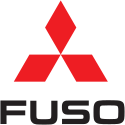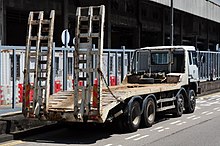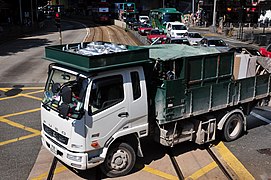Mitsubishi Fuso Truck and Bus Corporation
| Mitsubishi Fuso Truck and Bus Corporation
|
|
|---|---|
| legal form | Kabushiki-gaisha (joint stock company) |
| founding | 2003 |
| Seat | Kawasaki , Japan |
| management |
|
| Branch | commercial vehicles |
| Website | Mitsubishi Fuso Truck and Bus Corporation |
The Mitsubishi Fuso Truck and Bus Corporation (MFTBC; Jap. 三菱ふそうトラック·バス株式会社 , Mitsubishi Fuso Torakku Basu Kabushiki-gaisha ) is a Japanese manufacturer of commercial vehicles and part of Daimler Trucks .
Development of the company name
The first heavy Mitsubishi bus (model B46) was built in the ship and machine works of Mitsubishi Heavy Industries in Kobe and delivered to the Ministry of Railways in May 1932. To mark the occasion, the company's employees were asked to suggest a suitable nickname. The name Fuso won the race.
The word Fusō (derived from the Chinese term Fusang ) can be traced back to a sacred tree or a wonderful land with such named plants. This country has been equated with Japan in China . Since then the name Fuso has been used repeatedly, u. a. for sales companies.
history
MFTBC initially developed as an integral part of Mitsubishi Motors Corporation (MMC). After the first car in 1917, the first bus in 1932 and an eventful history u. a. Through the Second World War , automobile production developed independently in 3 parts of the group, before these were merged into MMC in April 1970 so that Chrysler could be involved. An intensive collaboration followed until Chrysler had to withdraw around 1991 due to its own problems. From around 1995 the problems at MMC began to pile up, so that a little later, sometimes reluctantly, they had to look for new partners with new capital.
On July 28, 2000, Volvo Trucks acquired a 5% stake in MMC for 39.5 billion yen. MMC was to separate the truck business from the other activities and transfer it to a separate department, which would then be spun off as an independent company and Volvo would have a 19.9% stake in it. On the same day, July 28, 2000, Daimler AG (then DCX ) acquired a 34% stake in MMC for 202.4 billion yen (2.1 billion €). The truck business was excluded, but Volvo feared the influence of Daimler and lost interest. Daimler signaled its willingness to buy Volvo’s stake and paid a further 760 million euros for it in April 2001. At the beginning of 2003, the spin-off originally planned with Volvo was realized with Daimler. Shortly after the founding of MFTBC, Daimler received the largest share with 43% against payment of 89 billion yen, other Mitsubishi companies 15% for 31 billion yen. MCC kept the remaining 42%. In March 2004, DCX was able to increase its stake to 65% in return for a payment of 52 billion yen, thereby gaining control of MFTBC. Immediately began a "radical cleansing of the past" and numerous subsequent product recalls. To compensate for this, DCX received the remaining 20% of the company shares in March 2005. On January 11, 2011, Daimler then acquired the stake in one of the other Mitsubishi companies, thereby increasing its stake in MFTBC from 85% to 89.29%.
In the meantime (2018) MFTBC is integrated into the Daimler development and production network. Daimler wants to achieve cost advantages by increasing the number of identical or similar parts and components. The engines of the current Fuso Super Great are largely identical in construction to Freightliner and Mercedes-Benz. The Canter plays a special role in the Fuso range . On the one hand, because there are no corresponding models in the delivery programs of Freightliner and Mercedes-Benz ( Mercedes-Benz Vario was discontinued in 2013). On the other hand, because the Canter has been the only model offered in Germany since 1981 (long before it was taken over by Daimler).
distribution
At the beginning of the cooperation between DaimlerChrysler (today Daimler) and MCC (2000-2004), the MCC sales company (s) in Germany and Europe were dissolved and Daimler took over sales. After the end of the cooperation, MFTBC was already majority owned by Daimler, so sales remained with Daimler. Similar procedures were followed in other countries in Europe.
Current models
- Canter
- FUSO eCanter
- Fighter
- Super great
- pink
- Aero midi
- Aero Star
- Aero Aceh
- Aero bus
- Aero Queen
- Aero King
Web links
- Mitsubishi Fuso (Japan)
- Mitsubishi Fuso Truck Europe (MFTE)
- Fuso in Germany
- Fuso at Daimler AG
- Youtube Channel Fuso Europe
Individual evidence
- ↑ Hartmut Schick is the new Fuso boss automobil-produktion.de, accessed on May 14, 2019
- ↑ Agreement finalized for VOLVO'S acquisition of shares in MCC
- ↑ DaimlerChrysler and Mitsubishi Motors sign agreements for alliance
- ↑ DaimlerChrysler AG and Mitsubishi Motors Corporation strengthen alliance
- ^ Mitsubishi Motors and DaimlerChrysler Complete Equity Alliance
- ↑ MMC-DaimlerChrysler commercial vehicle strategy to expand
- ^ Mitsubishi Motors, DaimlerChrysler, Mitsubishi Group Finalize Investment in Mitsubishi Fuso Truck and Bus
- ↑ Mitsubishi Motors to Sell 22% Fuso Stake to DaimlerChrysler
- ^ Fresh woe for Mitsubishi's trucks
- ↑ Mitsubishi Fuso Announces Radical Clean-up of Past
- ↑ Comment on the Transfer of MFTBC share (20%) possessed by MMC
- ^ Daimler AG Increases Equity in Mitsubishi Fuso Truck and Bus Corporation







